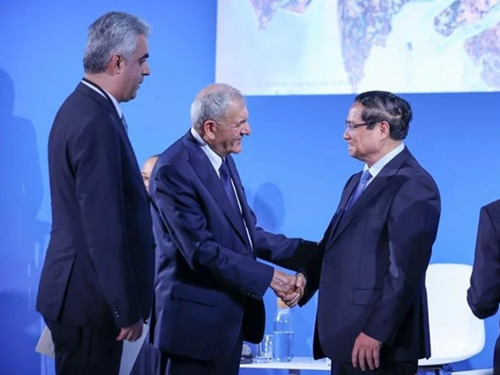The gathering drew nearly 100 delegates, including leaders from delta-rich nations like France, the Netherlands, Thailand, and Bangladesh, as well as representatives from international organizations focusing on delta management.
According to scientific studies and reports, deltas cover just 0.65% of the Earth’s land but support 4.5% of its population and produce 6% of global food output.
    |
 |
|
Prime Minister Pham Minh Chinh (right) shakes hands with Iraqi President Abdul Latif Rashid at the Deltas of the World Summit in Nice, France, on June 9. |
In his address, PM Pham Minh Chinh described deltas as vital cradles of human civilization, ecosystems, spaces for survival, sources of transboundary water, and long-standing socio-economic-cultural anchors for local populations. Yet, he warned, these fertile regions face existential threats from climate change, including sea level rise, land subsidence, erosion, drought, saltwater intrusion, biodiversity loss, and pollution - challenges that have shifted from distant warnings to daily realities threating the livelihoods of hundreds of millions in major deltas worldwide.
Speaking as a leader of a nation with extensive delta regions, PM Pham Minh Chinh called climate adaptation a historical mission. He outlined Vietnam’s approach, rooted in “living in harmony with nature” and pursuing multi-benefit, multi-target strategies. These include investments in infrastructure, climate-resilient development, green agriculture, and a 1-million-hectare low-carbon rice scheme. He also stressed the need for cross-border cooperation to protect shared water resources and fishery resources, with support from international partners.
Addressing transboundary water resources, he urged nations to engage in dialogue grounded in mutual respect, equality, and adherence to rules. Vietnam, he said, will proactively and actively collaborate with countries and regions to achieve the “dual goals” of contributing to global food security and reducing greenhouse gas emissions.
To achieve this goal, PM Pham Minh Chinh put forward a comprehensive, people-centered, and globally coordinated approach, proposing five strategic solutions. They consist of long-term, inter-regional, and inter-sectoral planning to transform the development model of deltas; conserving and utilizing indigenous knowledge in tandem with applying sci-tech advances, digital transformation, and artificial intelligence; fostering international cooperation and efficient connectivity in the global delta network; establishing and efficiently implementing green, sustainable, equitable, inclusive, and accessible climate finance mechanisms; and developing flexible, reasonable, and effective norms, standards, and procedures for delta regions.
The Government leader reaffirmed Vietnam’s consistent stance as a good friend, reliable partner, and active and responsible member of the international community in protecting and developing deltas that adapt to climate change.
He went on to underscore Vietnam’s readiness to share knowledge, management experience, and initiatives; to participate in regional and international cooperation mechanisms and initiatives; and to contribute to global efforts for climate change adaptation in delta regions.
Concluding his speech, the PM called on countries to unite and work together in both vision and action, so that deltas, the vibrant confluence between land and ocean, remain enduringly stable foundations for livelihoods and human life, as well as precious gifts of nature for the lasting and prosperous development of all countries and peoples around the world.
Sharing the Vietnamese leader’s views, Iraqi President Abdul Latif Rashid stressed the importance of deltas as cradles of human civilization and welcomed collective efforts and international cooperation to protect and develop them in response to climate challenges.
Rashid also highlighted the significance of effective water resource sharing mechanisms between countries, as well as the urgency of immediate action to ensure the sustainable development of river systems and delta regions before it is too late.
Ambassador Elizabeth Taylor, head of the Colombian delegation, emphasized that delta regions are not only rich in biodiversity but also serve as carbon sinks and natural shields against climate change. Colombia called for global action grounded in nature-based solutions, urging the promotion of local community knowledge to support delta development.
She also highlighted that restoring mangrove forests and addressing coastal erosion are a way of restoring humanity’s memory, and protecting deltas is synonymous with safeguarding the right to life for future generations.
French Foreign Minister Jean-Noël Barrot underlined the critical importance of the Deltas of the World Summit, stating that protecting deltas means protecting the oceans.
He shared two key priorities: better management of water resources and stronger efforts to combat climate change. He also called for turning he outcomes of the summit into momentum for concrete action, for future generations and in the spirit of international solidarity. Minister Barrot thanked Vietnam, Colombia, and Iraq for co-hosting this meaningful event.
During the session on conservation and sustainable management of delta ecosystems, experts, scientists, and policymakers from around the world discussed the potential of delta regions, assessed current threats, and proposed nature-based and technology-driven solutions for sustainable delta development.
In the session on sustainable development prospects and collective action in delta management, lively discussions centered on cooperation among river users and local communities, and how deltas can adapt to new global challenges. Delegates also highlighted the importance of joint efforts between delta management agencies and financial mechanisms to conserve biodiversity in these vital regions.
Source: VNA